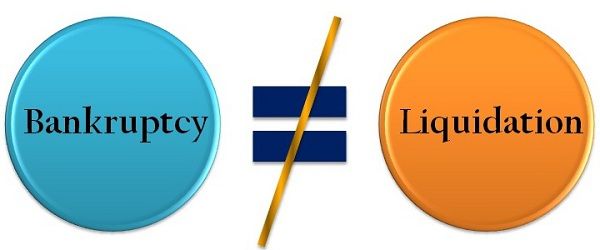Although bankruptcy and liquidation are sometimes used interchangeably, they are fundamentally quite different concepts. Although both might refer to insolvency—the inability to pay debts—they are not the same thing. Here, we go through the main distinctions between bankruptcy and liquidation that you should be aware of.
Describe liquidation:
Liquidation is an insolvency procedure available solely to businesses in Australia. It frequently happens when a business can’t pay its obligations or when the owners wish to shut down operations. When a business declares bankruptcy, a liquidator, an outside specialist, is chosen. The company’s financial affairs will be closed up by the liquidator, who will also orderly dissolve the company’s organisational structure.
The liquidator’s duties also include replacing the board of directors and looking into the business’s finances to see what went wrong. To pay off the business’s obligations, he or she will sell off the company’s assets.
An involuntary or voluntary liquidation is possible. When a corporation enters voluntary administration or when a Deed of Company Arrangement is cancelled, members or creditors may vote to liquidate the company. This normally occurs following a decision by members or creditors. A firm may also choose to go through with a liquidation if its shareholders decide to do so. On the other hand, involuntary liquidation typically occurs as a result of a court order.
A firm can only be entirely wound up and shut down through liquidation. For the business, this often means that the corporate directors relinquish full authority, fire staff, and freeze bank accounts. The liquidator will then work to close the business as cheaply as feasible.
Description bankruptcy:
In Australia, declaring bankruptcy is the same as declaring personal insolvency. When you are declared bankrupt, the law assumes that you are unable to make your debt payments. Most of your obligations, especially unsecured bills, might be discharged through bankruptcy, and debt collectors would be forced to stop calling you.
A legal status of bankruptcy lasts for three years. Although it can assist deter creditors and debt collectors, it can also have some negative effects on your financial future and should only be used as a last resort. For instance, a bankruptcy trustee will be appointed to oversee your bankruptcy. He or she has the authority to dispose of certain assets, such as your home and land. If you earn more than a specific amount throughout the repayment period, you can be required to make repayments.
A legal status of bankruptcy lasts for three years. Although it can assist deter creditors and debt collectors, it can also have some negative effects on your financial future and should only be used as a last resort. For instance, a bankruptcy trustee will be appointed to oversee your bankruptcy. He or she has the authority to dispose of certain assets, such as your home and land. If your income during this time exceeds a specific level, you can be required to make mandatory repayments.
In addition, your name will be permanently posted on the National Personal Insolvency Index (NPII), a public registry, and you will require your trustee’s consent before travelling abroad. Individuals who have declared bankruptcy are ineligible to manage or direct businesses. Finally, since bankruptcy can remain on your credit report for up to seven years, it may affect your future ability to obtain loans authorised.
Instead of immediately considering bankruptcy, you can try negotiating with your creditors and seeking guidance from financial professionals. But occasionally, your debtors may file a lawsuit against you and have you declared bankrupt. Therefore, filing for bankruptcy might be voluntary or not.
Companies are never subject to bankruptcy, but if you run a firm as a partnership or a solo proprietor, you may do so. Again, this just affects you personally; your company is not regarded as insolvent.
Important distinctions between bankruptcy and liquidation
The main contrast between liquidation and bankruptcy is that one is for businesses while the other is for people. Liquidation is a method or instrument to end a business in a controlled manner, whereas bankruptcy is a legal situation when an individual is declared insolvent, with associated legal repercussions.
Even though bankruptcy status only lasts for three years, it is not a permanent condition of things because it is eternally recorded in the public record (the NPII). The “end of the road” for a corporation, when its assets are auctioned off and its organisational structure is disassembled, occurs in liquidation, which has a permanent result.
In contrast to liquidation, bankruptcy affects both the debtor and his or her creditors. If a business goes into liquidation, it may have an effect on the directors, shareholders, creditors, and workers through job termination, debt recovery, or lack thereof.
Insolvency is the primary cause of bankruptcy, but there are additional circumstances that might lead to a company going into liquidation. A solvent firm may decide to liquidate itself if one or more of its members decide to discontinue conducting business. Both liquidation and bankruptcy, which have the potential to be either voluntary or involuntary and both require managing assets and making best efforts to settle debt, are last resort measures.
Liquidation and bankruptcy are two separate concepts that are occasionally misunderstood. The important distinction is that liquidation is only an option open to businesses, whereas bankruptcy is only available to people. Both are likely to result from insolvency or the inability to pay debts, although solvent businesses occasionally decide to go out of business for other reasons. Finally, liquidation results in a permanent winding down of a corporation, whereas bankruptcy is an intermediate rather than a permanent status.
Are you prepared to close your company down?
The next step is to talk with an expert for guidance specific to your circumstance if you’ve decided to liquidate your firm or are concerned about its future. We have qualified, skilled liquidators on our staff that can assist companies of all sizes. Call us right now at 0410 555 999.



